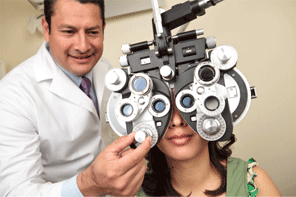An optometrist is an independent, primary health care provider who diagnoses and treats eye illnesses and connected structures, along with diagnosing related systemic conditions.
The primary reasons why people visit an optometrist can be:
- FARSIGHTEDNESS AND NEARSIGHTEDNESS:
Myopia, also known as nearsightedness, is a prevalent condition that is an aftermath of an elongated eyeball. The light entering the retina causes a lack of focus making it difficult to see faraway objects. On the other hand, hyperopia (farsightedness) is a condition that makes seeing nearby objects difficult. Farsightedness is typically a genetic disorder, and if it runs in your family, you also stand a high chance of developing it.
- DRY EYES:
This happens when your eyes lose the ability to produce tears properly, or in the case of inconsistent tears that vaporize quickly. This consequently results in the dryness, making some activities difficult, for example, reading a book or using a computer for longer periods of time. If left untreated, this condition can lead to scars and pain in the cornea, which leads to macular generation. The treatment of dry eyes is a specialty of an optometrist or eye doctor, so be sure to visit one without delay, and on the very first symptom.
- FOREIGN BODY REMOVAL:
Our eyes, being subjected to continuous exposure can be affected by foreign objects like a tiny piece of debris or a cosmetic product, which would require immediate removal through professional help. It is important to remember not to rub the eyes or go digging for the object while it still remains inside. This could further deteriorate the condition and make matters worse.
- FOR EYE EXAMS AND CHECK-UPS:
A complete eye check up every two years for adults and annual inspection for senior citizens is strongly recommended. These eye examinations are important to treat any issues that you may have before they get out of hand.
Eye tests are important to ensure normal eye sight development, and should be a priority in your health maintenance plan. An example of an eye test includes vision screening that helps identify people who are at risk of developing different symptoms. These tests are brief, and can also be performed by a pediatrician, a school nurse or a general health care provider.
Other reasons to visit an optometrist may include:
- An individual that requires a prescription for glasses and/or contact lenses.
- Diagnosing and treating conditions like cataracts, astigmatism and presbyopia
- Children requiring pediatric checkups.
- People requiring special, designer eyewear.
- Specialized glasses for sportswear, for instance ski goggles, which are also provided by optometrists.
- Diagnosing certain health conditions and diseases that ultimately affect the eye, including diabetes or hypertension.
- For treating different retinal diseases like cataracts and glaucoma. In certain parts of the world, optometrists go as far as treating these diseases.




